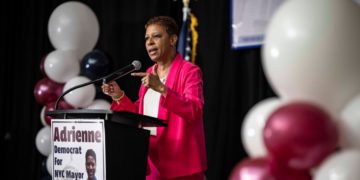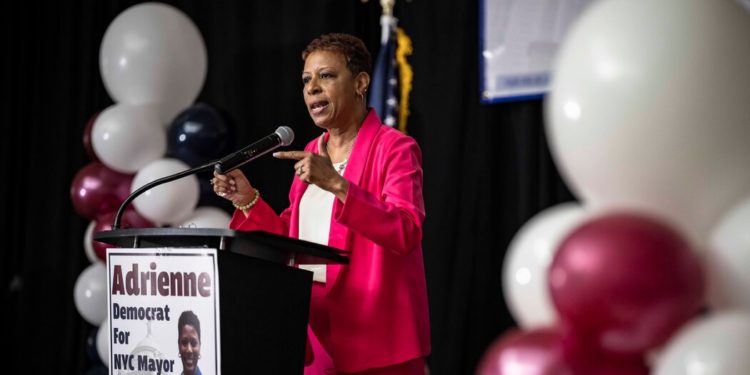Adrienne Adams, the New York City Council speaker who is running for mayor, will propose on Monday a guaranteed basic income program that would be the largest of its kind in the United States.
It would aim to help more than 21,000 homeless children and young adults.
The idea of giving families monthly checks — with no strings attached — took off across the nation during the pandemic after many people lost their jobs. Ms. Adams’s plan is her top campaign proposal as she tries to stand out from a crowded field of Democrats running in the June primary as the best alternative to former Gov. Andrew M. Cuomo, who leads in polls.
As Council speaker, Ms. Adams helped fund a guaranteed income program for 161 pregnant women.
“Ideology doesn’t solve problems: proven solutions do,” Ms. Adams said in a statement, adding that she wants to make sure that “we can end homelessness for the next generation by leading with what works.”
The program would help 15,000 homeless children who are 5 years old and younger, 6,000 unaccompanied homeless youth who are ages 18 to 24 and about 500 young adults who exit the foster system care on their own each year. It would provide an initial one-time stipend of $2,500, followed by monthly payments over three years that start at $1,000 per month and then fall to $500 per month.
Many of the other mayoral candidates have released ambitious policy plans. Zohran Mamdani, a state lawmaker from Queens, wants to make buses free; Brad Lander, the city comptroller, has pledged to end street homelessness for people with severe mental illness.
Guaranteed income programs have been popular among liberal Democrats as a way to offer a lifeline to vulnerable people and to help put them on a more stable path. Dozens of cities have started such programs, including Los Angeles and Chicago. Conservatives have argued that the programs are wasteful and have pushed for work requirements.
During New York City’s 2021 mayoral race, Andrew Yang, the former Democratic presidential candidate, proposed a guaranteed income plan that would have offered some New Yorkers roughly $2,000 per year. It was a pared-down version of his earlier universal basic income plan to give every American $1,000 per month.
Ms. Adams has been a fierce critic of Mayor Eric Adams, a Democrat who announced recently that he will run as an independent in the general election in November. Ms. Adams, who is not related to the mayor, entered the Democratic primary late and has trailed in polling and fund-raising.
She has argued that her experience negotiating the $114 billion city budget and thwarting cuts to libraries and preschool makes her the strongest candidate. She is also running on a message of integrity and “no drama,” criticizing Mr. Adams, whose administration has been marred by corruption investigations, and Mr. Cuomo, who resigned in 2021 after sexual harassment allegations that he denies.
Affordability has been a central issue in the race. Rents and child care costs have soared, and one in eight public school students in New York City is homeless.
Ms. Adams has also highlighted her support for the City of Yes housing proposal, an ambitious and contentious plan that was approved last year and could help create 80,000 new homes over the next 15 years.
Under Ms. Adams, the Council is spending $1.5 million this fiscal year to support a nonprofit called the Bridge Project that provides cash to new mothers. It was the first time that city funds were used on a guaranteed income program.
Her new proposal would cost the city roughly $430 million over two years and rely on social impact bonds, where private investors pay for early costs and the government repays them, and other private partnerships for the third year, her campaign said.
Much of the money in the existing program, which was paid to new mothers who were struggling to secure stable housing, was spent on basic baby supplies. But recipients said the checks also helped them cover housing, education and food costs. One mother bought a special high chair for her child, who was showing signs of cerebral palsy.
Ms. Adams argues that a guaranteed income not only helps families, but also reduces homelessness, improves public safety and could help bring down city spending on shelters. Many mothers who were in the program have moved to permanent housing and reported improvements in their mental health and stress levels.
Briana Drummer, 33, began receiving $1,000 per month through the City Council program last year when she was pregnant with her daughter. She grew up in foster care and was living in a family shelter before moving into an apartment in Harlem.
Ms. Drummer has used the money to pay for baby clothing, diapers and books for college, where she is studying psychology and expects to graduate next month.
“It’s been very helpful,” she said. “This is helping women have less stress on their shoulders.”
Emma G. Fitzsimmons is the City Hall bureau chief for The Times, covering Mayor Eric Adams and his administration. More about Emma G. Fitzsimmons
The post N.Y.C. Mayor Candidate Pitches Largest Guaranteed Income Program in U.S. appeared first on New York Times.



















